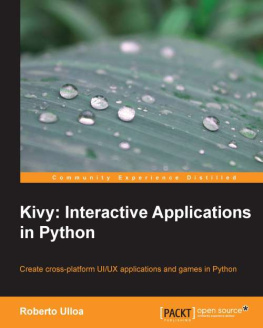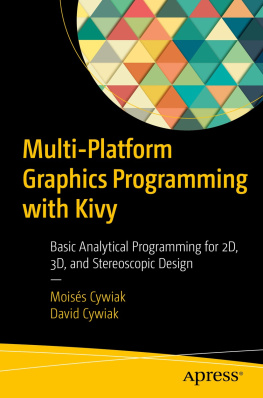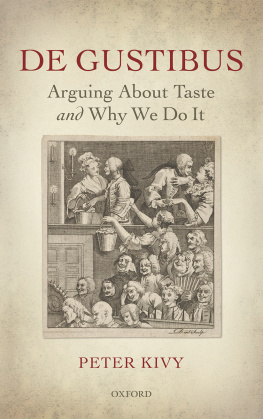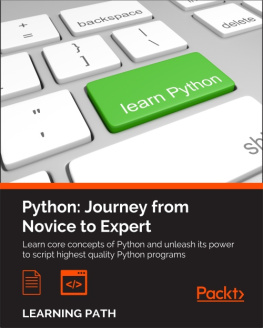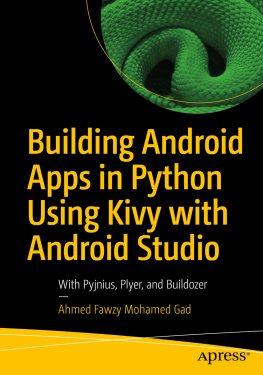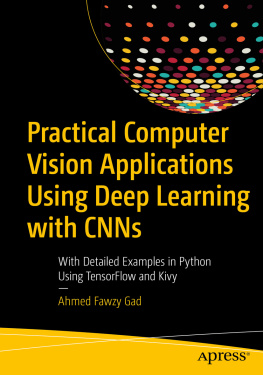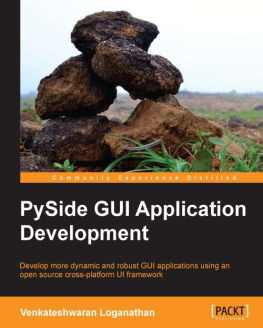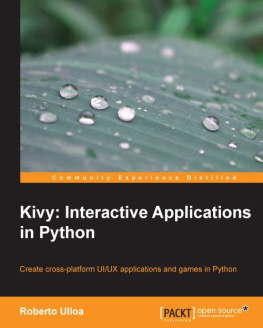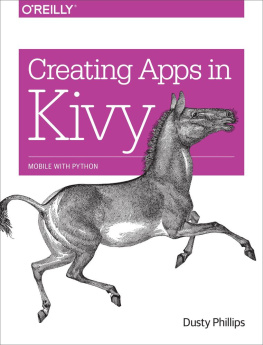He loves travelling and enjoys an itinerant life, living among different cultures and environments. He loves nature and has spent many months volunteering in Central and South America.
He currently lives in Kuala Lumpur, earning a living as a web developer in Python/Django and PHP/Wordpress. He constantly worries that the Internet has already become aware of itself and we are not able to communicate with it because of the improbability of it being able to speak Spanish or any of the 6,000 odd human languages that exist in this world.
Acknowledgments
I would like to thank Su, for not hesitating one second in encouraging and trusting my ability to write this book; for believing in me and motivating me with endless cups of coffee.
Javier de la Rosa, with whom I worked on my first Kivy projectthe one that gave birth to the blog post that caught the attention of my publishers.
My technical reviewers, Ana Arroyo, Javier de la Rosa, Hugo Sols and Andrs Vargas for their time and corrections.
My supervisor, Gabriela Barrantes, who has been a constant source of support and inspiration throughout my academic life.
My family and friends, for whom this book will be a surprise, and who've paid with the time that I didn't have to share with them.
The editorial personnel, for their patience in answering my questions.
Celina, for risking her Android to test my codes for the first time; for her constant motivation, support, and criticism even though I disagree that my Space Invaders look like bunnies and, if so, I still think they are terrifying space bunnies.
About the Reviewers
Ana Arroyo is a PMI certified Project Manager who loves software development and is passionate about how technology can be used to improve the quality of people's life and volunteering as a way to contribute to make a positive difference.
Over the last years, she has worked in the Education field, collaborating in the design and development of Learning Management and Student Information Management systems.
Andrs Vargas Gonzlez is currently pursuing a Master of Science in Computer Science through a Fulbright Fellowship at University of Central Florida (UCF). He received a Bachelor's degree in the same field from Escuela Superior Politcnica del Litoral (ESPOL) in Ecuador.
He is a member of the Interactive Systems and User Experience Lab at UCF. His current research is on machine learning techniques to reduce the time on gesture recognition in context. His previous works include enterprise multimedia distribution and exploring usability of multi-touch interfaces in Information Systems, which was tested on his DIY multi-touch surface. He is also interested in web applications development. He implemented some e-commerce solutions as well as Facebook applications in his home country and recently was working in the backend of an educational data resource system in Florida, USA.
Besides his academic and professional interests, he enjoys hiking high elevations, learning from different cultures, biking by the city, and finally, playing and watching soccer.
First and foremost, I would like to thank my four mothers for the values, love, and inspiration I got from them every moment of my life. I also wish to express my sincere gratitude to Shivani Wala for providing me an opportunity to be part of this great project. At the same time my special thanks to Michelle Quadros for keeping me updated with the deadlines and any doubt I had. Last but not least I wish to avail myself of this opportunity, express a sense of gratitude and love to my relatives, professors, and friends.
Javier de la Rosa is a full-stack Python developer since 2005, when he first met the Django web framework. During his years in Yaco, one of the main FLOSS-based companies in Spain, he leaded the Research and Development Team, participating in both European and national projects. Late in 2009, he started to collaborate with The CulturePlex Lab for Cultural Networks research, at the Western Unviersity in Canada, in his sparse time. As a result, he left Yaco in 2010 and joined the laboratory to lead and supervise technical and software developments. Today, he is still in charge of the developers team as well as conducting his own research on Big Culture, where he mixes his background as a BA and MA in Computer Sciences, Logics and Artificial Intelligence by the University of Seville, and his recent acquired skills as a 3rd year PhD student in Hispanic Studies at Western University in Canada. Currently, he just started his 1st year as a PhD in Computer Sciences, focusing on Graph Databases and Query Languages.
A regular collaborator of Open Source projects, he is the owner and main developer of qbe (http://versae.github.io/qbe/) and neo4j-rest-client (https://github.com/versae/neo4j-rest-client). In the academic field, he is author of several articles, as well as one of the writers of the book Programming Historian 2 (http://programminghistorian.org/). You can always contact him on Twitter (@versae) or GitHub under the nickname versae .
Hugo Solis is an assistant professor in the Physics Department at University of Costa Rica. His current research interests are computational cosmology, complexity and the influence of hydrogen on material properties. He has wide experience with languages including C/C++ and Python for scientific programming and visualization. He is a member of the Free Software Foundation and he has contributed code to some free software projects. Currently, he is in charge of the IFT, a Costa Rican scientific non-profit organization for the multidisciplinary practice of physics. (http://iftucr.org)

